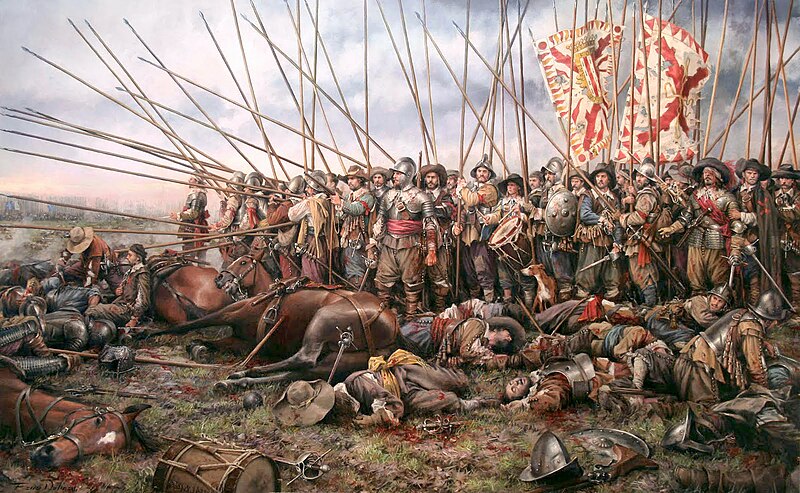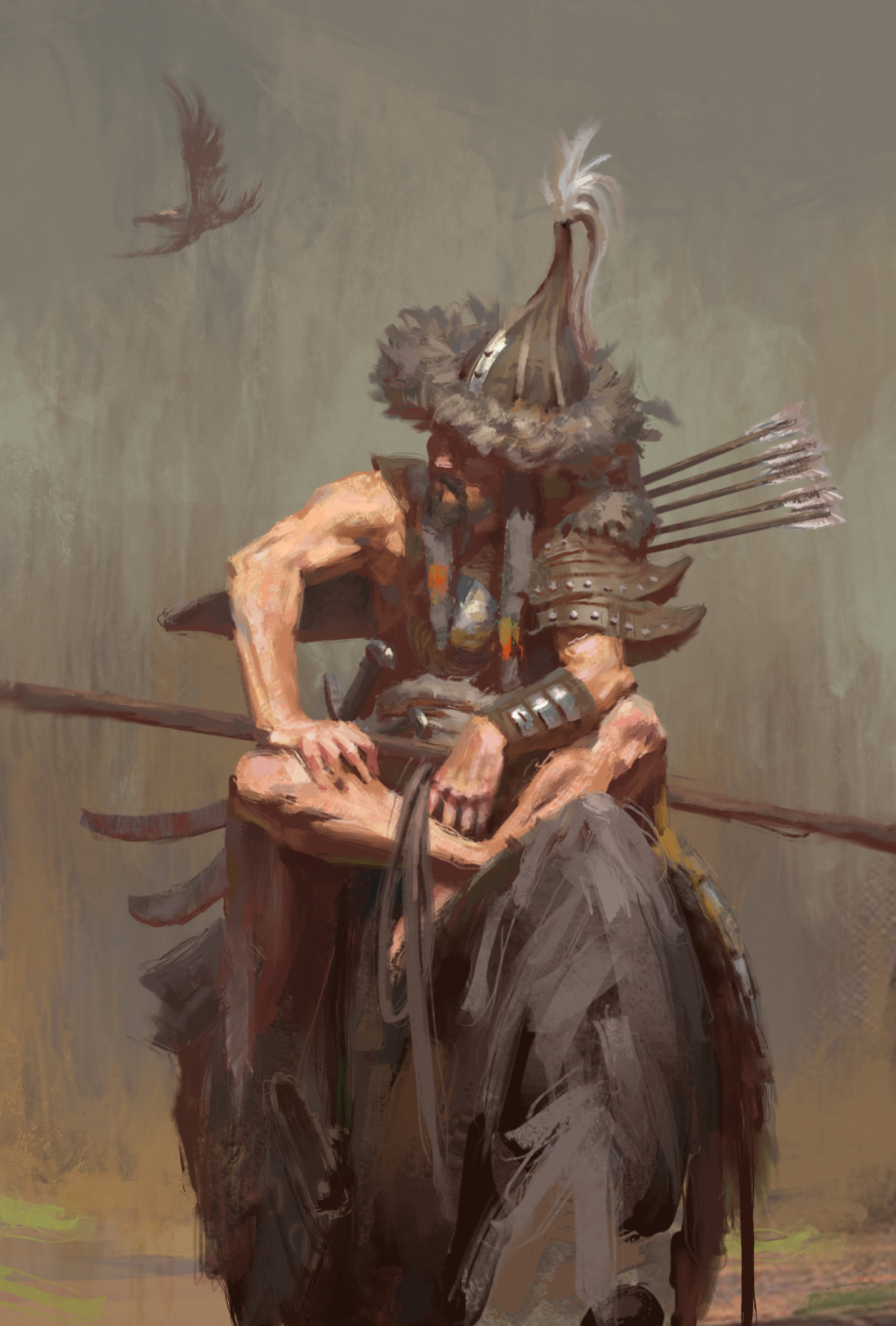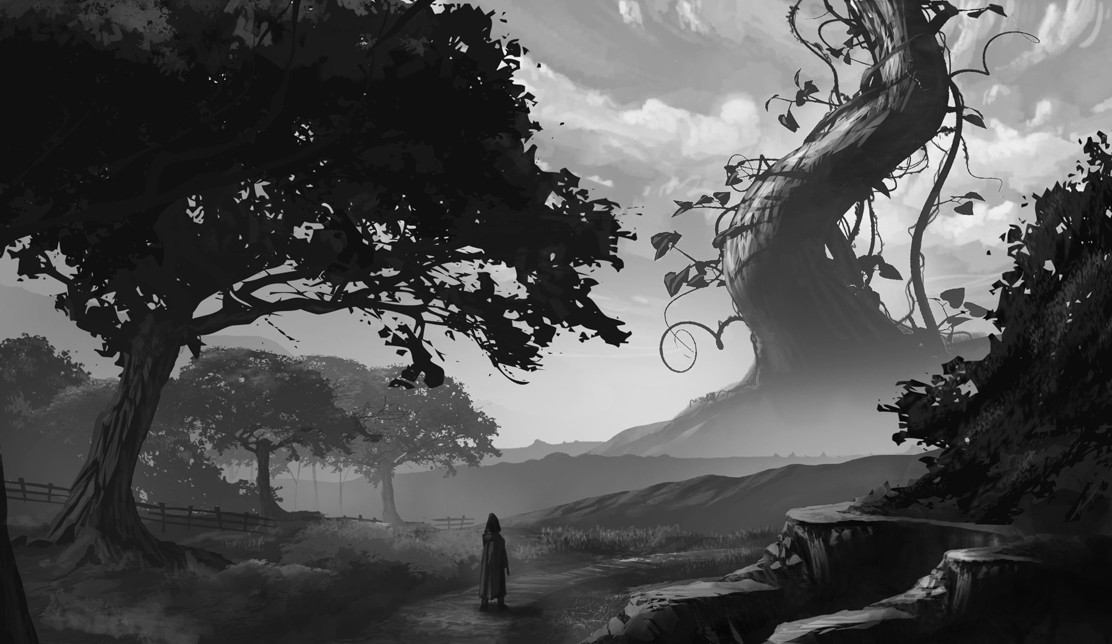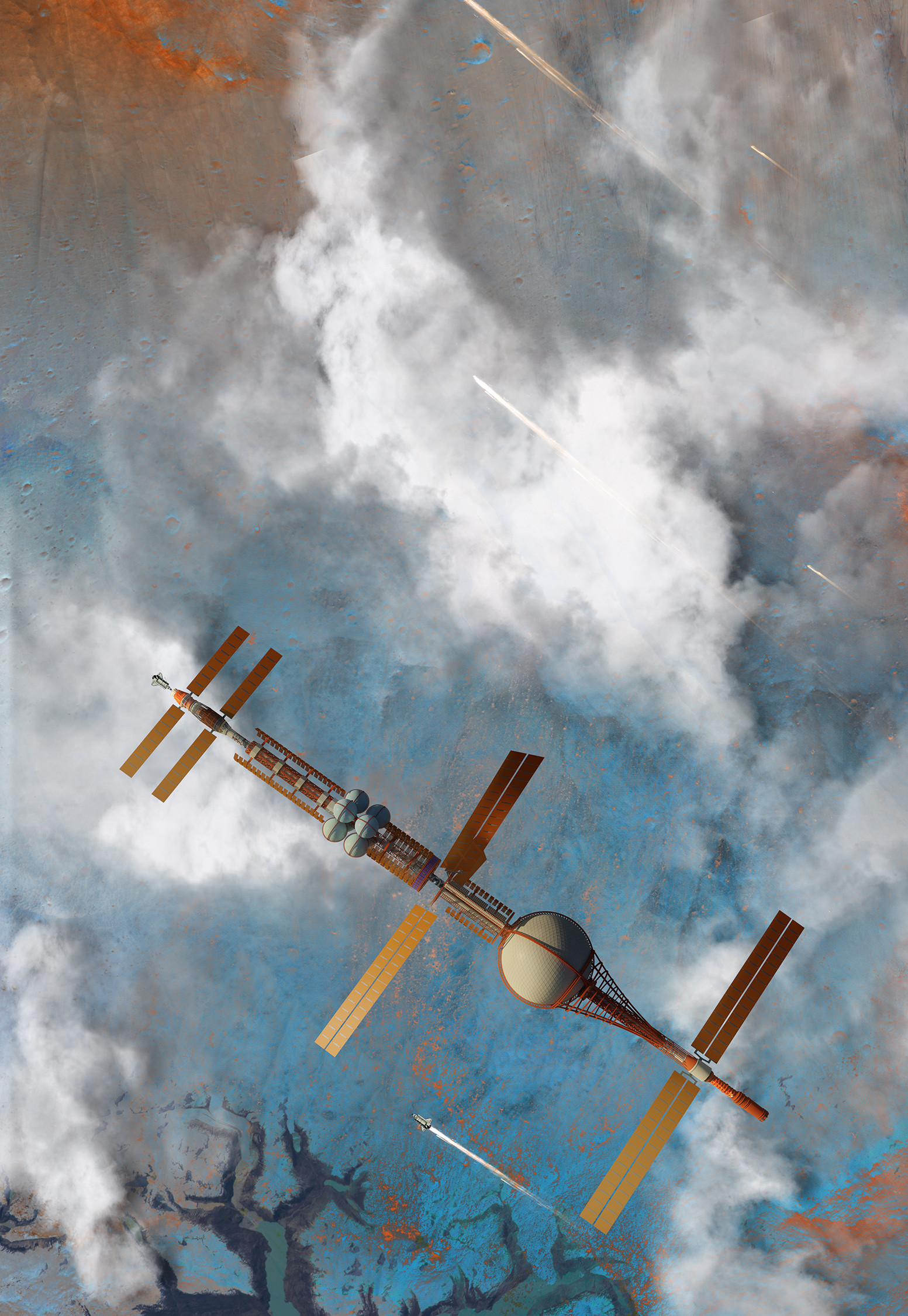"In the grip of holy ecstasy I look upon the face of the Divine, and he knows that our cause is right and just!" - Father Edric Vahlen, the 'Red Priest'.
Another Pike & Shotte class! This will be the last non-wizard class I'll be posting - I've got some thoughts on Fighters and Thieves to come but I'm not sure how much I'll be changing them overall. More wizards will be coming soon.
A Reiver could be compared to a Ranger of sorts - they have good Stealth and tracking skills and can put out a decent amount of damage. Fighters will stick close to their baseline of being combat masters who can soak and deal damage in equal measure. Thieves will be their usual sneaky selves. A Zealot, on the other hand, is essentially a holy barbarian - they are warriors in the grip of the Divine, who care little for their own safety as they hurl themselves at their enemies. Some of the background options might lead to some reskinning of the above, so develop these ideas as you see fit.
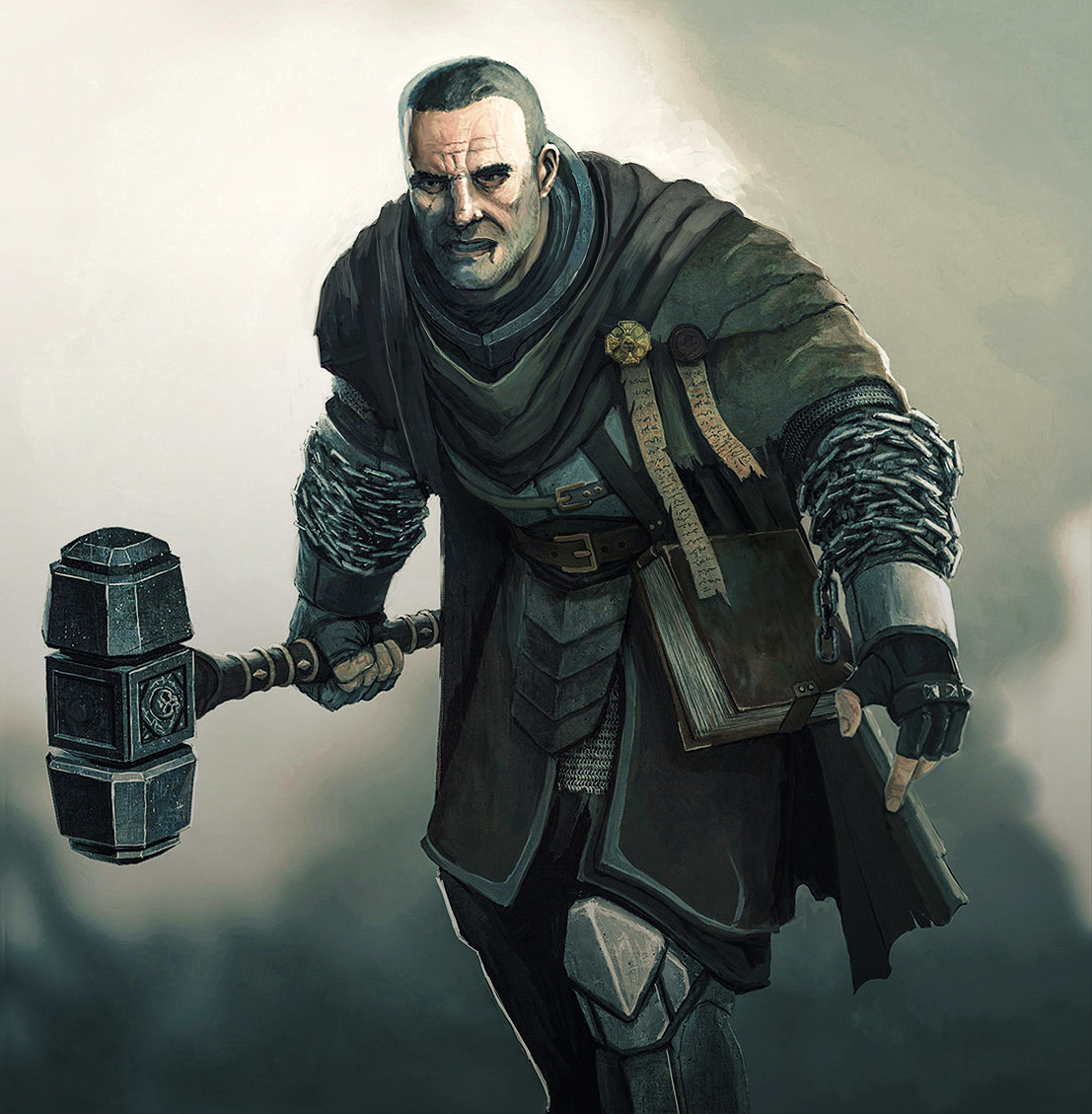 |
| Credit, Thomas Woods |
Zealot
Starting Equipment: medium weapon, torch, holy symbol (wood), vial of holy water.
A: Rage; Conviction
B: Feel No Pain
C: Iron Will; Zealous Accusation
D: Martyr
You gain +1 to Saves vs mind-altering effects and/or fear for every Zealot template you possess.
Rage
You can choose to enter a rage at the start of your turn, or in response to taking damage. While in a rage, you have +1 Attack stat and all your melee attacks inflict +1 damage. You might froth, or stare in battle-focus, or merely let a facade drop and give in to your ancient urges, brutal warrior training, or religious fanaticism.
While raging, you cannot do anything defensive, curative, or tactical with your allies. All you can do is attempt to kill things. Spellcasting is not impossible, but all your spells must be damaging spells, which deal +2 damage (if single target) or +1 damage (if multiple targets). Mishaps and Dooms may be more severe. While raging, you cannot stop fighting until you kill, subdue, or drive off all enemies. You can will yourself to stop raging with a 2-in-6 chance of success at the start of your turn as a free action. If one of your allies has injured you this fight, they count as an enemy.
While raging, you cannot do anything defensive, curative, or tactical with your allies. All you can do is attempt to kill things. Spellcasting is not impossible, but all your spells must be damaging spells, which deal +2 damage (if single target) or +1 damage (if multiple targets). Mishaps and Dooms may be more severe. While raging, you cannot stop fighting until you kill, subdue, or drive off all enemies. You can will yourself to stop raging with a 2-in-6 chance of success at the start of your turn as a free action. If one of your allies has injured you this fight, they count as an enemy.
Conviction
Choose an ideal linked to your faith when you gain this skill. Not something as broad as one of the seven virtues, but a goal that your faith compels you to meet - destroy witches, purge the undead, restore lost shrines etc. This is the reason for your zealous faith and cannot be changed. Once per day you may take 2 Boons on a roll made in relation to your Conviction.
Feel No Pain
You may negate all incoming damage from an attack as a free action. Keep a record of the damage you would have taken. At the end of combat, Save. If you fail then you immediately suffer that much damage. You can do this a number of times per day equal to the number of Zealot templates you have.
Iron Will
Your rage becomes focused and cold. You are able to think tactically while using the Rage ability and need not devote all of your actions to attempting to harm your enemies. You may end your rage on a 4-in-6 instead of 2-in-6.
Alternatively, you may use this power to automatically resist a non-damaging mental or magical effect as a free action. If you do so, you lose the rage ability benefit of this power until you have rested for the night.
Alternatively, you may use this power to automatically resist a non-damaging mental or magical effect as a free action. If you do so, you lose the rage ability benefit of this power until you have rested for the night.
Zealous Accusation
As a free action, you spit a litany of hatred at a target, detailing their spiritual, physical and mental shortcomings in excruciating detail and condemning them as an affront to the Divine who opposes His rightful servant and will be subject to your punishment. The target must Save (with the PC's CHA modifier applied as a penalty) or flee in shame. This Save is made with 1 Bane if the target is at least moderately religious or a member of a heterodox faith, and with 1 Boon if they are of an entirely different faith or not religious at all. This only affects targets that can understand you and would reasonably take offence.
Martyr
Once per day you may ignore Fatal Wounds for 1d6+1 Rounds. You may give in at any time before you reach the maximum rounds rolled. Once this time is up you suffer additional Fatal Wounds equal to the amount of Rounds spent acting. If you die tales will form around the story of your death, even if you died far from civilisation and no-one lived to carry your story back.
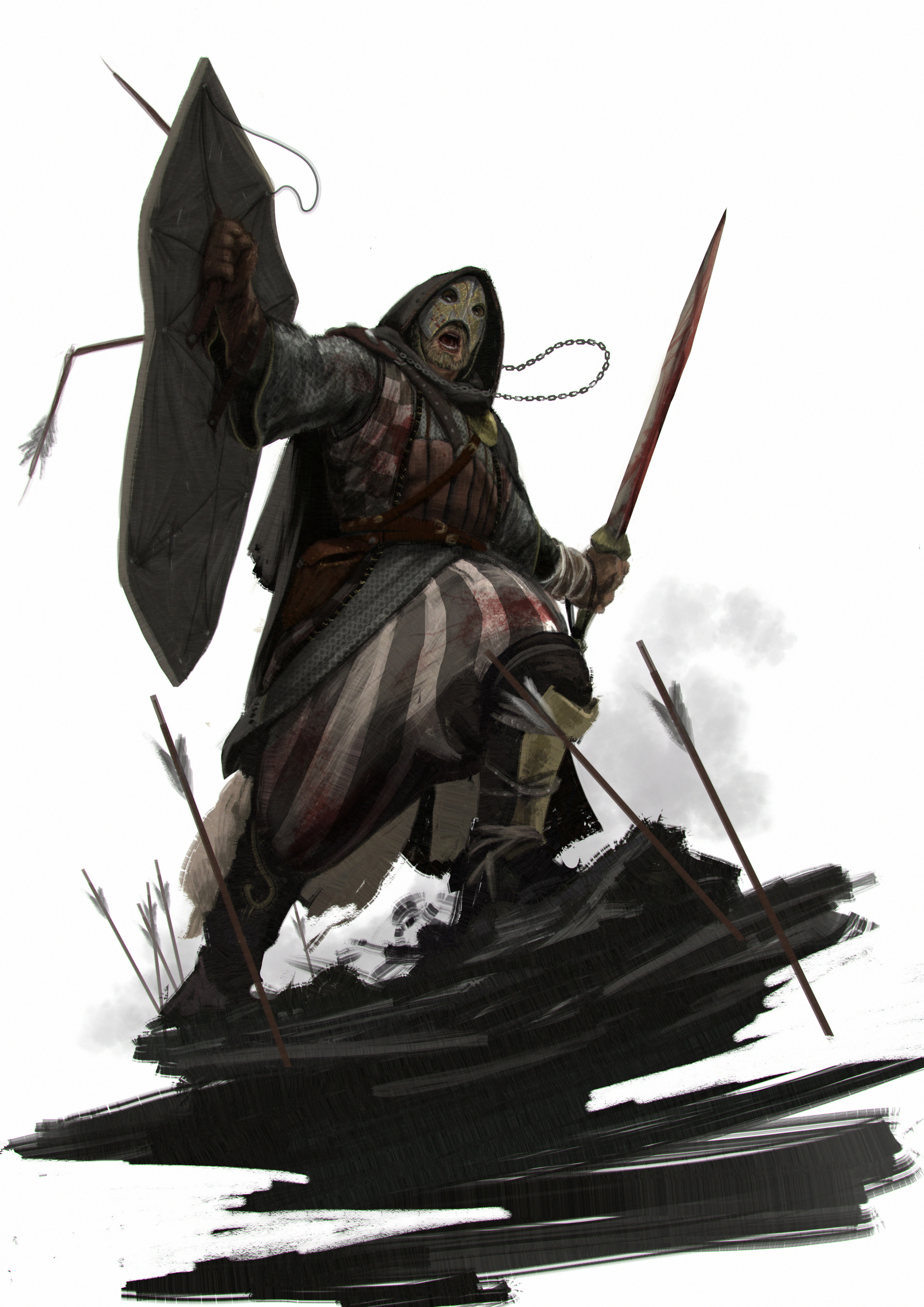 |
| Credit, Mirko Failoni |
Backgrounds
Roll and gain the following background, then roll on the results underneath. Asterisks indicate that you are literate:
1. Clergy; 2. Foreigner; 3. Soldier; 4. Unusual
1.* Clergy
1. You entered cloistered life thinking that you would find peace in prayer and the adoration of the Divine. Instead you found boredom, irritability and a nagging urgency. Start with the 'Religion' skill, a tattered habit and a holy text.
2. Your zeal was noticed in hidden corners of the Church and you were offered a role in enforcing the will at the tip of a sword. Start with light armour, 3 days-worth of rations and a cipher ring that allows you to decode secret orders.
3. You trained to become a priest but grew to despise the opulence and grandeur of the Church. You've since embraced the mendicant lifestyle as an errant preacher, wandering in search of your goal. Start with the 'Vagabond' skill, a heavy cloak and 3 days-worth of rations.
4. As a rabble-rouser and witch-taker you operated on the periphery of the Church, but you knew your cause was just. Start with the 'Torture' skill, a 50' chain, and 3 flasks of oil.
5. Even among hardliners your beliefs were regarded as extreme. Gradually the more orthodox of your peers pushed you out. Start with a borderline heretical holy text and gain +2 to all Saves vs fear.
6. You spent days fasting and meditating at a time and had a vision of a Divine angel, who showed you the true path and marked your soul. This actually happened. You gain 1 Boon on all rolls to endure lack of food, water and sleep, and your soul-ward grants you 1 Boon to resist the powers of non-Divine Outsiders (non-angels/daemons, this doesn't apply to their regular physical attacks but does apply to magical abilities they possess).
2. Foreigner
1.* Your god(s) are strange and alien to the people of this land but their song thrums in your blood and you chant their Divine words as you smite their heathen foes. Start with the 'Singing' skill, a chime and a book of holy hymns in your native tongue.
2. Unlike the dreary, dour churches of the local faith, your order gives praise to your god(s) in wild, ecstatic dances. Your form is a blur both in worship and on the battlefield as you cut your enemies to ribbons with wild abandon. You start with the 'Dancing' skill, loose silk robes (10gp) and make all Combat Manoeuvres with 1 Boon.
3.* An old schism rent the Church in its early days, and your people worship on the other side of that divide. Your religious practices are like the local ones but pitched through a warped mirror. Start with an inverted holy symbol, a holy text in a foreign liturgy, a vial of holy water, and the ability to shock a local priest into speechlessness through the mere existence of your heresy.
4. Your sect was small, but feared by locals and invaders alike. Blades in the night, poison in wine, a silk cord from above, all of these and more were your weapons in your Divine struggle. Start with the 'Murder' skill, a garrote, and 3 doses of somniferum.
5. You hail from hard, cold lands and serve a grim god. You do not know why you have been dispatched to this land of weaklings, only that you must go. Start with winter clothing and 50' of rope. You take 1 Boon on all foraging attempts.
6. Your people worship the elemental spirits that permeate and exist within all things, not the crude godhead of the local lands. Start with the 'Forestry' skill, a bow and a quiver of 20 arrows. You gain 1 Boon when communicating with spirits of nature.
3. Soldier
1. You believed for a time that serving in the army would be the best way to further your convictions, but you were mistaken. All you found on the front lines was pointless blood and slaughter. Start with the 'Tactics' skill, medium armour and an Interesting Scar.
2. You led services before battles, whipping your audience into a murderous frenzy before leading the charge yourself. Start with the 'Demagogue' skill and replace your Medium weapon with a Great weapon.
3. You give glory to the Divine through combat. In your mind, they care not from where the blood flows, only that it flows. Start with an Interesting Scar, medium armour, and a shield.
4. As a man-at-arms in service to the Church you were not well versed in theology and religion, but your violence in the Divine's name was rewarded. Start with light armour and 2gp.
5. You died on the battlefield, bleeding out from a horrendous gut wound. The Divine blessed you as your sight faded and you awoke hours later, somehow alive in a field of corpses. Start with light armour and a holy symbol (wood). You remove a Fatal Wound on 2-in-6 instead of 1-in-6.
6. You protected pilgrims and travellers on their journeys to holy sites before your order was forcibly dissolved. Start with medium armour and a warhorse (with saddlebags).
4. Unusual
Discuss your background with the GM depending on the option you roll below:
1. You serve the mightiest god, who is destined to consume all other gods. Start with an extra 3 days-worth of rations. If you consume an item of religious significance to another faith you can add 1 Boon to a subsequent roll of your choosing. You can only have 1 Boon stored at once.
2.* There are other powers worthy of your attention besides the gods. They respect your ambition and grant you strength. Start with the 'Occult' skill, a piece of chalk and 5 candles. You know the infernal tongue of daemons and devils.
3. During the looting after a siege, you witnessed your comrades set a church alight after plundering it. Seized by an unknown force, you plunged into the flames and emerged largely unharmed from the burning building with an ashen relic held in your grasp. Start with the 'Arson' skill, a holy relic (20gp to the right buyer) and medium armour.
4.* The undead are an affront to the Divine and must be purged wherever they are found. The last of an order of hunters trained you in their ways before they passed. Start with the 'Undead' skill and a silver holy symbol. You know when an undead creature is less than 100' away, but not the specific direction.
5.* Your sect of witch-takers were dissolved after it was learned that you had taken to emulating the practices of those you hunted, the better to fight them. Start with 1 Magic Dice and a spellbook containing a randomly rolled spell. You can tell if an item is magical or not in the same way as a wizard.
6. The Fey are a force of insidious corruption and chaos that lurk in the midst of civilised lands. You are intimately familiar with them and know their evil. Start with the 'Fey' skill and a silver & rowan circlet. You can speak the Elvish language and can recognise the creations of the Fey.
1. Clergy; 2. Foreigner; 3. Soldier; 4. Unusual
1.* Clergy
1. You entered cloistered life thinking that you would find peace in prayer and the adoration of the Divine. Instead you found boredom, irritability and a nagging urgency. Start with the 'Religion' skill, a tattered habit and a holy text.
2. Your zeal was noticed in hidden corners of the Church and you were offered a role in enforcing the will at the tip of a sword. Start with light armour, 3 days-worth of rations and a cipher ring that allows you to decode secret orders.
3. You trained to become a priest but grew to despise the opulence and grandeur of the Church. You've since embraced the mendicant lifestyle as an errant preacher, wandering in search of your goal. Start with the 'Vagabond' skill, a heavy cloak and 3 days-worth of rations.
4. As a rabble-rouser and witch-taker you operated on the periphery of the Church, but you knew your cause was just. Start with the 'Torture' skill, a 50' chain, and 3 flasks of oil.
5. Even among hardliners your beliefs were regarded as extreme. Gradually the more orthodox of your peers pushed you out. Start with a borderline heretical holy text and gain +2 to all Saves vs fear.
6. You spent days fasting and meditating at a time and had a vision of a Divine angel, who showed you the true path and marked your soul. This actually happened. You gain 1 Boon on all rolls to endure lack of food, water and sleep, and your soul-ward grants you 1 Boon to resist the powers of non-Divine Outsiders (non-angels/daemons, this doesn't apply to their regular physical attacks but does apply to magical abilities they possess).
2. Foreigner
1.* Your god(s) are strange and alien to the people of this land but their song thrums in your blood and you chant their Divine words as you smite their heathen foes. Start with the 'Singing' skill, a chime and a book of holy hymns in your native tongue.
2. Unlike the dreary, dour churches of the local faith, your order gives praise to your god(s) in wild, ecstatic dances. Your form is a blur both in worship and on the battlefield as you cut your enemies to ribbons with wild abandon. You start with the 'Dancing' skill, loose silk robes (10gp) and make all Combat Manoeuvres with 1 Boon.
3.* An old schism rent the Church in its early days, and your people worship on the other side of that divide. Your religious practices are like the local ones but pitched through a warped mirror. Start with an inverted holy symbol, a holy text in a foreign liturgy, a vial of holy water, and the ability to shock a local priest into speechlessness through the mere existence of your heresy.
4. Your sect was small, but feared by locals and invaders alike. Blades in the night, poison in wine, a silk cord from above, all of these and more were your weapons in your Divine struggle. Start with the 'Murder' skill, a garrote, and 3 doses of somniferum.
5. You hail from hard, cold lands and serve a grim god. You do not know why you have been dispatched to this land of weaklings, only that you must go. Start with winter clothing and 50' of rope. You take 1 Boon on all foraging attempts.
6. Your people worship the elemental spirits that permeate and exist within all things, not the crude godhead of the local lands. Start with the 'Forestry' skill, a bow and a quiver of 20 arrows. You gain 1 Boon when communicating with spirits of nature.
3. Soldier
1. You believed for a time that serving in the army would be the best way to further your convictions, but you were mistaken. All you found on the front lines was pointless blood and slaughter. Start with the 'Tactics' skill, medium armour and an Interesting Scar.
2. You led services before battles, whipping your audience into a murderous frenzy before leading the charge yourself. Start with the 'Demagogue' skill and replace your Medium weapon with a Great weapon.
3. You give glory to the Divine through combat. In your mind, they care not from where the blood flows, only that it flows. Start with an Interesting Scar, medium armour, and a shield.
4. As a man-at-arms in service to the Church you were not well versed in theology and religion, but your violence in the Divine's name was rewarded. Start with light armour and 2gp.
5. You died on the battlefield, bleeding out from a horrendous gut wound. The Divine blessed you as your sight faded and you awoke hours later, somehow alive in a field of corpses. Start with light armour and a holy symbol (wood). You remove a Fatal Wound on 2-in-6 instead of 1-in-6.
6. You protected pilgrims and travellers on their journeys to holy sites before your order was forcibly dissolved. Start with medium armour and a warhorse (with saddlebags).
4. Unusual
Discuss your background with the GM depending on the option you roll below:
1. You serve the mightiest god, who is destined to consume all other gods. Start with an extra 3 days-worth of rations. If you consume an item of religious significance to another faith you can add 1 Boon to a subsequent roll of your choosing. You can only have 1 Boon stored at once.
2.* There are other powers worthy of your attention besides the gods. They respect your ambition and grant you strength. Start with the 'Occult' skill, a piece of chalk and 5 candles. You know the infernal tongue of daemons and devils.
3. During the looting after a siege, you witnessed your comrades set a church alight after plundering it. Seized by an unknown force, you plunged into the flames and emerged largely unharmed from the burning building with an ashen relic held in your grasp. Start with the 'Arson' skill, a holy relic (20gp to the right buyer) and medium armour.
4.* The undead are an affront to the Divine and must be purged wherever they are found. The last of an order of hunters trained you in their ways before they passed. Start with the 'Undead' skill and a silver holy symbol. You know when an undead creature is less than 100' away, but not the specific direction.
5.* Your sect of witch-takers were dissolved after it was learned that you had taken to emulating the practices of those you hunted, the better to fight them. Start with 1 Magic Dice and a spellbook containing a randomly rolled spell. You can tell if an item is magical or not in the same way as a wizard.
6. The Fey are a force of insidious corruption and chaos that lurk in the midst of civilised lands. You are intimately familiar with them and know their evil. Start with the 'Fey' skill and a silver & rowan circlet. You can speak the Elvish language and can recognise the creations of the Fey.
